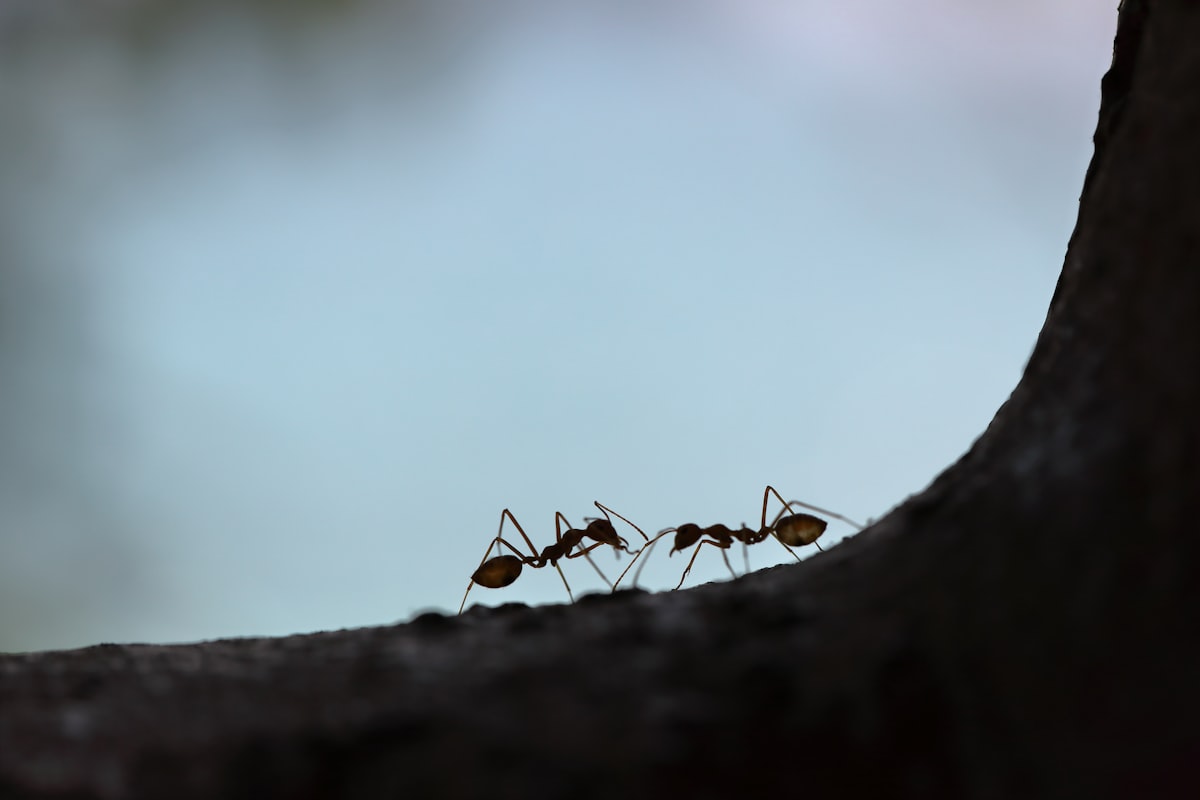Ants

The Matchmaking Ant - a Korean Folktale
An angleworm wanted to get married, so he asked an ant to act as
a go-between and find him a wife.
The ant arranged for the angleworm to wed a thousand-legged worm.
When the angleworm heard this, he cried: “Oh, no! I never could keep her in shoes!”
This tickled the ant, and he went and told the thousand-legged worm what her husband-to-be had said.
She answered, “It is just as well, for the angleworm is so long I should never be able to make enough clothes to keep him covered!”
This answer amused the ant so much, that he started laughing so hard he had to tie a rope around his waist for fear of bursting; and to this day the ant shows the result of this in his attenuated waist.
General Ant Lore
If ants flourish in your yard, it was said to be a good sign of prosperity.
Saying “mumblyup” over an ant-hole, will bring the ants to the surface.
For a bride to accidentally step on an ant-hill, signifies that she will
die an unusual death.
Pour water upon an ant-hill, and you will discover a stone of divers
colours, which, if held in the right hand, will permit you to go invisible. | (Brand.)
‘When ant-hills are high early in the morning, it is a sign of a fine
day.
To step on an ants’ mound and kill a number of ants, is a sign of
rain.
Adversity will overtake the person who carelessly or intentionally
destroys ants or their homes, as they are omens of thrift.
If you kill ants, they will runover your dead body before you
are buried.
It is a bad sign to destroy an ants’ heap of sand.
When ants are more busy than usual, the weather will be stormy.
Combats between swarms of ants presage war.
To be stung by an ant in the night, is a sign of prosperity.
If ants make their heap near your door, it betokens good fortune
for the family.
Black ants are good luck; red ants, bad luck,
Ant Lore of Europe, Asia, and Africa
In ancient Greece, there was a race who claimed descent from ants. They were called Myrmidons. Oddly enough, the Ashanti (Ghana) believe the same thing, but it is the Incra tribe is the clan of ants.
In Cornwall, it is unlucky to destroy ants’ nests.
In India, many insects are regarded with veneration. The ant was
fed by Hindus and Jainas on certain days, with flour and sugar.
Some of the Dravidians, like the Juangs, took their oaths on an
ant-hill.
We read, in Purchase’s “Pilgrims,” that the natives of Malabar
would go out of the path rather than to run the risk of treading on an
ant, when they see an ant-hill.
With the natives of India, it was a common opinion that where red
ants colonize, prosperity attends the house.
In Finland, they made boys eat ants in the spring, to make them
grow up strong.
When the Phrygian king, Midas, was a child, ants carried a number
of grains of wheat into his mouth while he slept, from which omen it
was predicted that he would be immensely rich, He afterwards wished
that everything he touched would turn into gold, and Bacchus granted his petition.
In India, both men and women believed that to treat ants well, is to
insure thrift and plenty. Therefore, they frequently deposit sugar near
ants’ nests in the morning, as a good act of charity to begin the day
with.
Ant Lore of the Americas
A common belief among early Black Americans was that if you kill ants, the
rest of the colony will begin to dig your grave.
When ants make a nest in the house; it is a sign that some malicious person has placed them there to bring evil on the inhabitants. (Ancient Mexican.)
In the West Indies, a procession of ants in the house, especially if it
contains a “passion-ant,” is a sure sign of death.
A superstition prevailed in Washington and Virginia, that it was very
unlucky to destroy an ant, as it is a fairy and will bewitch the cows
so that they cannot give milk. (Early Black American.)
In the West Indian islands, a procession of ants was said to presage
a funeral.
Sloan tells us that the Spaniards of the West Indies have a very highly medicated earth, which is supposed to be made of the nests of
ants.
In the West Indies, there is an ant so full of poison that when arrow tips are smeared with them, not one in four hundred of the wounded escape death.
Ants will not cross a chalk-mark. You simply have to take a piece of
chalk, and draw a circle around the dish you wish to protect. (New
England.)
When ants make a nest in a dwelling, it is a sign that some envious or malicious person had placed them there, with the evil purpose of bringing misfortune upon the family. The presence of a frog or a mouse was accounted for in the same way. (Mexico.)
Black women in the West Indies would use chicken-soup instead of
hot water, on the invading army of black ants, believing that if kindly
treated, they will show their gratitude in the only way that ants can
manifest it—by leaving.
‘The ants bring their eggs up out of their underground retreats and
expose them to the warmth of the sun, to be hatched. When they are
seen carrying them in again in great haste, though there is not a
cloud in the sky, there will certainly be a storm. (Texas.)
Writings about Ants
Ctesias (5th century Greek physician) makes mention “of horse-pismires [horse ants] living in hollow trees, which were fed by the magi, till they grew to such a vast bulk as to devour two pounds of flesh a day.” (7. Brown's Works.)
“Ants never sleep. This is a recently observed fact.” (Ralph Wal-
do Emerson's “Nature.”)
Annius writes that an ancient city, situated near the Volscian
Lake, was in times past overthrown by ants, and that the place was
thereupon commonly called to this day, “The Camp of Ants.” (Hau-
ley’s “Wonders.”)
Thevenot (French travel writer), in his “Travels in the Levant,” mentions Solomon’s ants among the beasts that shall enter Paradise, according to the belief of the Turks, and gives the following reason: “Solomon was the greatest being that ever was, for all creatures obeyed him and brought him presents. Among others, an ant brought him a locust, which it had dragged along by main force. Solomon, perceiving that the ant had brought a thing bigger than itself, accepted the gift, and preferred it before all other creatures.”
Martial has written the following epigram about a lucky ant, who
gained immortality by being enclosed in a drop of amber:
“A drop of amber from the weeping
Fell unexpected and embalmed an ant;
‘The little insect we so much contemn
Is, from a worthless ant, become a gem.” (Martial, Book 1)

Source
Encyclopaedia of superstitions, folklore, and the occult sciences of the world. : a comprehensive library of human belief and practice in the mysteries of life ... Editorial staff: Cora Linn Daniels and C.M. Stevans. (1903). Chicago.





